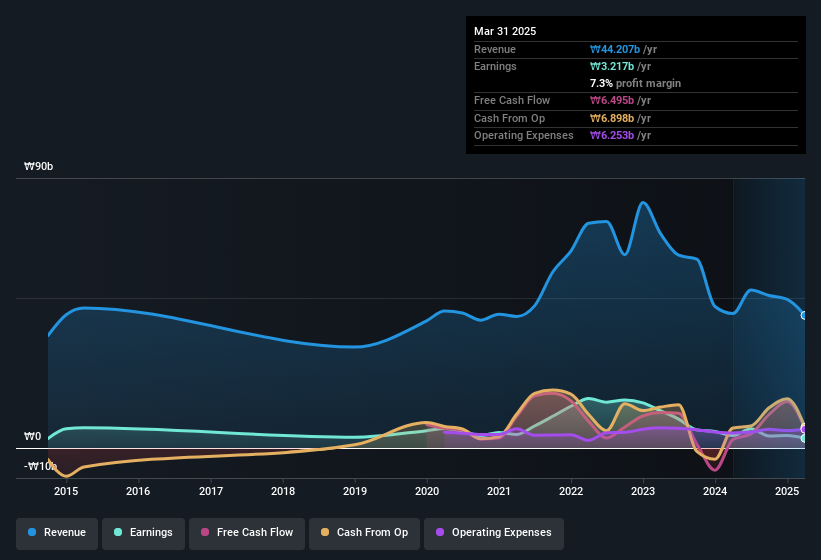- South Korea
- /
- Semiconductors
- /
- KOSDAQ:A089790
JT's (KOSDAQ:089790) Soft Earnings Are Actually Better Than They Appear
Shareholders appeared unconcerned with JT Corporation's (KOSDAQ:089790) lackluster earnings report last week. We think that the softer headline numbers might be getting counterbalanced by some positive underlying factors.

Examining Cashflow Against JT's Earnings
One key financial ratio used to measure how well a company converts its profit to free cash flow (FCF) is the accrual ratio. To get the accrual ratio we first subtract FCF from profit for a period, and then divide that number by the average operating assets for the period. The ratio shows us how much a company's profit exceeds its FCF.
That means a negative accrual ratio is a good thing, because it shows that the company is bringing in more free cash flow than its profit would suggest. While it's not a problem to have a positive accrual ratio, indicating a certain level of non-cash profits, a high accrual ratio is arguably a bad thing, because it indicates paper profits are not matched by cash flow. Notably, there is some academic evidence that suggests that a high accrual ratio is a bad sign for near-term profits, generally speaking.
For the year to March 2025, JT had an accrual ratio of -0.12. That indicates that its free cash flow was a fair bit more than its statutory profit. Indeed, in the last twelve months it reported free cash flow of ₩6.5b, well over the ₩3.22b it reported in profit. JT shareholders are no doubt pleased that free cash flow improved over the last twelve months. However, that's not all there is to consider. The accrual ratio is reflecting the impact of unusual items on statutory profit, at least in part.
View our latest analysis for JT
Note: we always recommend investors check balance sheet strength. Click here to be taken to our balance sheet analysis of JT.
How Do Unusual Items Influence Profit?
JT's profit was reduced by unusual items worth ₩1.1b in the last twelve months, and this helped it produce high cash conversion, as reflected by its unusual items. This is what you'd expect to see where a company has a non-cash charge reducing paper profits. While deductions due to unusual items are disappointing in the first instance, there is a silver lining. We looked at thousands of listed companies and found that unusual items are very often one-off in nature. And, after all, that's exactly what the accounting terminology implies. JT took a rather significant hit from unusual items in the year to March 2025. All else being equal, this would likely have the effect of making the statutory profit look worse than its underlying earnings power.
Our Take On JT's Profit Performance
In conclusion, both JT's accrual ratio and its unusual items suggest that its statutory earnings are probably reasonably conservative. Based on these factors, we think JT's underlying earnings potential is as good as, or probably even better, than the statutory profit makes it seem! Keep in mind, when it comes to analysing a stock it's worth noting the risks involved. Our analysis shows 3 warning signs for JT (1 is a bit unpleasant!) and we strongly recommend you look at them before investing.
After our examination into the nature of JT's profit, we've come away optimistic for the company. But there are plenty of other ways to inform your opinion of a company. Some people consider a high return on equity to be a good sign of a quality business. So you may wish to see this free collection of companies boasting high return on equity, or this list of stocks with high insider ownership.
New: Manage All Your Stock Portfolios in One Place
We've created the ultimate portfolio companion for stock investors, and it's free.
• Connect an unlimited number of Portfolios and see your total in one currency
• Be alerted to new Warning Signs or Risks via email or mobile
• Track the Fair Value of your stocks
Have feedback on this article? Concerned about the content? Get in touch with us directly. Alternatively, email editorial-team (at) simplywallst.com.
This article by Simply Wall St is general in nature. We provide commentary based on historical data and analyst forecasts only using an unbiased methodology and our articles are not intended to be financial advice. It does not constitute a recommendation to buy or sell any stock, and does not take account of your objectives, or your financial situation. We aim to bring you long-term focused analysis driven by fundamental data. Note that our analysis may not factor in the latest price-sensitive company announcements or qualitative material. Simply Wall St has no position in any stocks mentioned.
About KOSDAQ:A089790
JT
Engages in the research, development, and sale of semiconductor process and automation equipment in South Korea and internationally.
Adequate balance sheet with low risk.
Market Insights
Community Narratives




